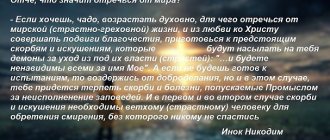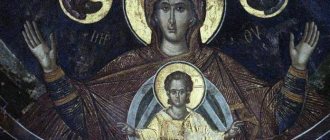Monk - who is this?
A monk is one who has given his life to serving God. This is not his choice - but his calling. Many go to the monastery, and only a small part eventually become monks, since monasticism is not a skill that you can master, but destiny.
A monk does not stop living on earth, does not stop doing any work for the monastery or for people (this is called obedience), but every minute of his life is dictated by serving God, and not by earthly ideas, goals or ideals.
From now on, he strives to live like an angel, not a man. The only core and meaning of his life is prayer.
How is a monastic vocation different from a choice?
Let's imagine: there are no monasteries in the world. But there will be people who will still try to live like a monk - seeing that money is dust; live celibately and purely, but not from “complexes”, but from an understanding of things; to live - multiplying love.
Monastic vows
The monk takes vows of celibacy, obedience and non-covetousness.
Celibacy
In its deepest sense, this vow does not simply mean a refusal to have a wife (or a husband, if she is a nun), but an understanding: gender no longer matters, it no longer exists. The monk left the world, and outside the world - only souls.
Vow of obedience
The monk gives up his desires. The will and willpower remain with him, but from now on they are aimed at prayer and the desire to constantly be with the Lord.
In a monastery, this vow is formed in the form of unquestioning obedience to the abbot. And this is not servility and submission, but joy and peace, because in renouncing the ego, true freedom is found.
Vow of non-covetousness
If a person becomes a monk, nothing belongs to him anymore - not even a ballpoint pen. And not because it is prohibited (although it is prohibited), but because it is not necessary.
A soul that has known the Lord at least once, that has come into contact at least once with the Greatness of the Holy Spirit, loses interest in everything earthly. Everything earthly fades, just as for a young man who falls in love with a girl, most circumstances lose significance.
Here, in the monastery, all things become unnecessary, and only those that are needed out of necessity remain in our hands: books, a telephone. And this is not the property of the monk, but of the monastery.
Scientific Secretary of the SFI, Master of Theology, Professor A.M. Kopirovsky
“Take My yoke upon you and learn from Me, for I am gentle and lowly in heart, and you will find rest for your souls; For My yoke is easy and My burden is light” (Matthew 11:29-30) [1].
How to learn the humility of Christ? – By accepting His yoke on your shoulders. But in order to bear this yoke, “sweet” in the mouth, but bitter in the belly (Rev 10:9-10) with dignity, different means are needed. Among them are vows.
The word “vow” usually means a promise given to God of some good deed that depends on the free will of a Christian (to visit someone, make a pilgrimage, donate money for something, etc.). There are also vows to abstain from matters that are questionable, or even downright sinful (for example, abstaining from drinking alcohol for a person suffering from the disease of drunkenness, etc.). But there are also vows of abstinence from things that are not just permitted, but also blessed by God.
The word “vow”, “vows” (singular - neder; plural - nedarim;) is used many times in the Bible. The first time is in the book of Genesis, in the story about the forefather Jacob, when he, in the hope that God will save him on his journey, promises God a tenth of everything that God gave him (Genesis 28:20-22). He promises freely, on his own, without “prompts” and, especially, demands from God. In the same sense, the word “vow” is used to describe many Old Testament events (for example, Jephthah makes a vow, in the event of victory over the enemies of Israel, to sacrifice to God what comes out to meet him from the gates of his house - and fulfills it, despite the fact that His own daughter is the first to come out to him (Judges 11:30-31), Anna also makes a vow, promising to give her son Samuel as a gift (to serve) God (1 Samuel 1:11, etc.). The mysterious vows of Nazariteism are also known - a person’s dedication to God of himself (albeit for a while), which was outwardly expressed in the refusal of any grape fruit, primarily wine, from cutting hair and touching a dead body, even if it is the closest relative ( Numbers 6:2-8).
Taking vows in the Old Testament texts is certainly encouraged. “Make vows to the Lord your God,” says the Psalm (Ps. 76:12), and this is not the only place where Scripture has a positive attitude towards vows. However, the benefits of taking vows were questioned or even outright rejected by most Talmud teachers. Thus, interpreting the expression of Ecclesiastes: “When you make a vow to God, do not hesitate to fulfill it... It is better for you not to promise than not to fulfill your promise” (5:3-4), Rabbi Meir believed that “it is better than both (i.e. giver and fulfiller - A.K.) one who does not make a vow at all.” Rabbi Dimi called the one who takes the vow a sinner (Nev. 77b); there was even an opinion expressed that, as a punishment, the children of the one making the vow would die young (Shab. 32b). Tractate Shulchan Aruch (ID. 203:7) allows only vows aimed at getting rid of bad habits. Apparently, the audacity and self-confidence often manifested in practice associated with taking vows, or, conversely, horror and despair at their failure to fulfill them, forced these teachers to follow common sense more than the word of Scripture. On the other hand (and, most likely, this was even the main thing), the vows seemed to them somewhat similar to the “inventory” (“numbering”) of the people of God, recklessly carried out by King David (1 Chron. 21: 1-7), leading to the establishment of formal, objectified, indirect relations between man and God.
In the texts of the New Testament, the word “vow” is completely absent (the only exceptions are Acts 18:18 and 21:23, but they also talk about the fulfillment of the Old Testament vows by the apostle Paul and Timothy). In part, for the same reasons that were expressed by the teachers of the Old Testament. But the main reason now was the coming of the Messiah-Christ. His life, death and Resurrection made any formalization of relations with God impossible at all - even where the Old Testament not only allowed this, but also considered it pious. “Sons are free,” Christ says to Peter when he tries to oblige the Teacher to simply pay taxes on the temple (Matthew 17:26). Therefore, a person who has been “bought” by the Blood of Christ, who has come to know the Truth and therefore is free (John 8:32) should not oblige himself to do something for the sake of God. Such a vow will always be given for something, i.e. people “uncontented” and, therefore, not free, even if in the flesh they are “the seed of Abraham and were never slaves to anyone” (John 8:33). In fact, it turns into an oath.
While clearly forbidding oaths (“But I say to you, do not swear at all” in Matthew 5:34), Christ, however, never said that he forbids vows if they are given to God freely, from the fullness of the heart. Therefore, it is not surprising that in the text of the book of the Acts of the Apostles we find the word “obligation” identical to the concept of “vow”. It refers to baptism. When the same app. Peter reminds the people of the passage of ancient Israel, fleeing from the Egyptians, through the Red Sea, he speaks of water: “... which now saves you, as the fulfillment of the type of baptism, which is not the removal of the uncleanness of the flesh, but an obligation (in the Synodal translation - “ promise") of a good conscience before God through the resurrection of Jesus Christ" (1 Pet 3:21). So, baptism itself, which externally is immersion in water, and internally, mysteriously, into the Holy Spirit and fire (Matthew 3:11), also becomes an obligation to have a good conscience before God. Hence the uniqueness of such an obligation.
The most striking example of the fulfillment of this vow was St. Paul, who boldly responded to those who accused him of rejecting the Law: “I have lived my life in all good conscience before God until this day” (Acts 23:1). There are other strong expressions in Scripture regarding conscience: “evil conscience” (Heb. 10:22), “defiled conscience” (Titus 1:15), “hardened conscience” (1 Tim. 4:2), also characterizing the person as a whole. . They are opposed by the already mentioned “good conscience” (also 1 Pet 3:16 and many others), as well as an “immaculate conscience” (Acts 24:16) and a “good conscience” (1 Tim 3:9).
What does this mean exactly? The fact that the apostle was not engaged in anything other than fulfilling the commandments of God. He could have done it very or not very well, perhaps even poorly at one time, but his conscience was clear. Because he did not give up on God in anything, doing every work of his own for His sake, i.e., simply put, he simply did not have any “his” affairs. In this he is echoed by the apostle. John, saying: “We... keep His commandments and do those things that are right in His sight” (1 John 3:22), and moreover: “... as He is, so are we in this world” (1 John 4:17). So, let us repeat: all the vows of baptism consist in the obligation to have a good conscience before God, and the fulfillment of this obligation leads a person to become like Christ.
Many will probably say, slightly paraphrasing the words of the apostles at the beginning of their spiritual journey: well, if these are the requirements for the baptized, then it is better not to be baptized, or, at the very minimum: well, this was possible only for the apostles. Yes, modern Christians usually do not even dare to look at such a height. O.A. Sedakova, speaking at our conference “Freedom is a gift of the Spirit and a calling in the church and society,” recalled how once in Jerusalem a Jewish writer asked her: “What do you celebrate on Easter, what kind of liberation?” - wanting to compare this with the liberation of ancient Israel from Egyptian slavery. “From death,” I answered without thinking twice. - From sin. Of this world." He asked me with interest: “Yes? And now, in fact, you are no longer there?” (in English it sounds shorter, and therefore even more deadly ironic: “Really? And you are outside now?”) ... I just have to sigh” [2].
But, in fact, is it possible for an ordinary person to take upon himself in baptism a vow to always have a good conscience before God? After all, there are no such words in the rite of baptism
The priest asks the person being baptized: “Do you renounce Satan, and all his works, and all his angels (or: servants), and all his worship, and all his splendor?
... Announced: I renounce!”
… Priest: “Are you united with Christ?
... Announced: I match!” [3].
Actually, the person being baptized does not seem to take on any specific obligations. However, this is not so, since the renunciation itself here is actually the pronouncement of a “negative” vow or “promise” (Hebrew – “esar”). Unlike the Old Testament vows relating to individual human sins and vices (remember, such vows were allowed to be taken even by those teachers of the law who rejected the possibility of other vows), the negation here is pronounced on “this world”, because it “lies in the power of the evil one (according to the synod translation: lies in evil)” (1 John 5:19). And the “positive” part of the vow (Hebrew – “n`eder”) - combination with Christ - extends the obligation of donation to the whole world (no longer “this world”). He is still imperfect, he “groans and suffers in labor until now” (Rom. 8:22), but evil does not rule over him and in him, this world is in many ways even beautiful. However, you need to give it to God too. After all, baptismal immersion “into Christ” presupposes: the baptized becomes one with Him, and after that it is impossible to have anything of one’s own. Only then does a person become truly free - which is expressed so simply and consistently in the First Epistle of John.
So, let us repeat: all baptismal vows consist in a commitment to have a good conscience before God, which means dying to the world of sin and even ceasing to be simply the “best part” of the world in general, confessing that “our citizenship is already now in heaven” (Philippians 3:20 ).
Therefore, in principle, one could answer that Jew who asked about our liberation - yes, we are “outside”, we are outside of sin, curse and death. True, only when we have the fruits of our vows: we love not only those who love us, but also those who are indifferent and enemies (Matthew 5:44), and we lay down or are even only ready to lay down our soul (i.e., life) for them (John 15: 13) with one goal - that they would turn to Christ and eternal life.
But even in the era of the apostles, this was not always the case and not for everyone (just remember Ananias and Sapphira - Acts 5:1-11). Moreover, in the era of “apostolic men” that followed, and even more so in the early Byzantine era, at the turn of the 3rd-4th centuries. At this time, many church members had a strong feeling that the church was becoming better integrated into society, so to speak, growing into the ground. And, as a consequence of this, the participation in Christ received in baptism and the freedom born from it leave her.
Monastic vows
There was an urgent need to reinforce this involvement with new vows given in the cultural forms of the “Greco-Roman synthesis,” which included the culture of Palestine, and in the most rigid forms. And now not all Christians made these vows, but only those who, like the Egyptian youth Anthony (the future St. Anthony the Great), having heard the words of Christ in the Gospel: “Leave everything and follow Me,” literally turned them to themselves. Even too literally, since he practically identified “this world” with the world of God. And therefore he went into the desert, a place “empty” not only of culture, but also of people, thus becoming one of the first “monks” (from the Greek “monos” - one).
Soon the desert was filled with those seeking the same life, and therefore making such very radical - monastic - vows of service to Christ. The vows were specified like “`esar” – “n`eder”, “no” – “yes” of the Old Testament. These were vows of “non-covetousness”, i.e. complete absence of personal property; "chastity", i.e. first of all - celibacy; and, finally, “obedience,” understood, first of all, as the submission of one’s sinful will to an older, more spiritually experienced person. Let us recall, however, that in the gospel only those who were too attached to it were called to renounce personal property, i.e. he made an idol out of her (see the parable of the rich young man - Matthew 19:16-26). Celibacy, which was not assumed in any vows of the Old Testament, incl. Nazirites - only abstinence from marital relations for a while and in exceptional cases (see, for example, the question about this to King David and his companions before eating temple bread - 1 Samuel 21: 4-5.), in the New Testament was considered the best state, than marriage (1 Cor 7:38), but in no way necessary for salvation. The vow of obedience appeared largely in connection with the mechanical extension of the expression of the apostle to everyone who wants monasticism. Paul “imitate me” (the synodal translation added “as I am Christ”), although it was addressed only to those whom he himself personally “…begat in Christ Jesus… through the gospel” (1 Cor 4:15-16).
As a result, the church was divided not only into the clergy and the “world” (the world around us except the altar - “this world”), but also into “monks” and “laity” (the world except the “desert” - “this world”). This division finally took shape almost simultaneously with the formation of the famous “symphony” of church and state in the 6th-7th centuries.
Let us give a more complete list of monastic vows. These are the questions that have been asked to everyone who accepts monasticism for many centuries: “...does he come to the Lord of his own free will? Do you agree to renounce the world according to the commandment of the Lord? Will he remain in the monastery and fasting even until his last breath? Will he preserve himself in virginity, chastity and reverence even until death? Will obedience to the superior and to all brothers in Christ remain until death? Will Christ remain in poverty and freely until death for the sake of poverty? Will he endure all the sorrow and hardship of the monastic life of the Kingdom for the sake of the Heavenly Kingdom? To all these questions, the tonsured person answers: “I cooperate with God, honest father,” and thus makes monastic vows” (Archbishop Averky (Taushev)).
Only in the twentieth century did some reassessment of values take place in this area. The vows of “non-covetousness” and “obedience” by the best representatives of monasticism - for example, Archimandrite (later - Archbishop and Holy Martyr) Hilarion (Troitsky) - were attributed to the general Christian foundations of life, which, therefore, did not imply taking them in the form of a special vow. “Monastic vows,” he wrote in 1915, “being universal Christian vows in their moral content, have a, so to speak, subjective meaning. They represent the conscious repetition of the baptismal vows given. The monastic vow during tonsure is a solemnly declared determination to take seriously one’s calling as a Christian” [4].
However, the question remains: why can’t this title be taken seriously already at baptism? After all, this indirectly affirms the impossibility of fulfilling the vows of baptism except in monasticism! The answer to this question is Archimandrite. Hilarion doesn't give it. Moreover, in his approach one can see his attitude towards monastic vows is still not entirely in the New Testament spirit. Firstly, he perceives them not as a joyful sacrifice from the fullness of faith and love, but as a severe necessity. “...Someone is better than us without repeating vows, without tonsure. After all, a healthy person can be stronger even without medication than a sick person. But the patient needs medicine. Vows are medicine” (Ibid.). Secondly, he calls the main difference between these vows and general Christian ones only the existence of a special discipline and strictly defined rules of behavior among monks. “When tonsured, a monk accepts and lovingly kisses all the statutes and rules of monastic life drawn up by the holy fathers” (Ibid.).
However, Christian life made its own adjustments to these statutes and rules. Thus, the vows of knightly orders became an interesting variant of monastic vows. Initially purely monastic (poverty-obedience-celibacy), they served to prepare for personal military exploits. The feat was intended for the knight not so much to “show himself” as to ensure a common victory over the Gentiles (for example, to liberate Jerusalem). But in the XIV century. in the Order of the Passion of the Lord by Philippe de Maizières, mandatory celibacy was replaced by the requirement of a chaste life for spouses. Then, in the same order, the vow “summa perfectio”, previously unknown in knighthood, was introduced, i.e. highest perfection, which had, first of all, a spiritual character [5]. Exotic and eccentric private vows, such as the obligation to drink three cups of wine stew before entering into battle in honor of the Holy Trinity, etc., or the well-known custom of challenging anyone to battle for the sake of the lady of his heart (justly ridiculed, for example, in Don Quixote) ), were common in knighthood, but still not the main ones.
The modern practice of taking monastic vows is being enriched with more and more new forms. Thus, one of the LiveJournals recently contained a description of parish tonsure (in fact, monasticism in the world, which is, in a sense, a contradiction in terms), and along the way interesting thoughts were presented about its rite and content. Here they are: “The monastic vows that are supposed to be pronounced according to the current Great Book of Breviaries have been heavily edited compared to pre-revolutionary practice. So, for example, in the modern succession of monastic tonsure from the Great Book of Breviaries, there are absolutely no vows regarding the prohibition of owning personal property. This is quite reasonable, because... all modern monks, one way or another, own their own property, and the times of strict communal rules, according to which it was forbidden to own even the slightest property, are long gone. We went further along the same path (the author of the text belongs to the ROCOR - A.K.) and removed from the following of monasticism those vows that relate exclusively to monastic life (the vow to never leave the monastery and the vow to obey the abbot). Since we do not have a monastery or abbot, it is completely pointless to make such vows” (Dmitry Shabanov - logothet).
Since there are many such cases - from mass secret tonsures in the world as a means of preserving the faith and the church in the era of the dominance of militant atheism in the USSR to “parish monasticism” as an everyday phenomenon (meaning not only the clergy, but also altar girls), we can confidently say that The line between monks and zealous laymen is becoming increasingly thin, and the formula “even a bad monk is better than a good layman”, one hopes, will soon finally become a thing of the past.
So, something unusual appears: monasticism without the vows of non-covetousness and obedience? Yes! Archim. It is no coincidence that Hilarion calls celibacy the only actual monastic vow. And although he himself is an inspired apologist for monasticism, for him celibacy, in accordance with the position of St. Paul (see above, 1 Cor 7:38), there is only a better opportunity to serve God: “... with an equal desire to please God, a single person has more favorable conditions for the fulfillment of his good desire than a married person. But to look for in the words of the Apostle a teaching about the moral superiority of celibacy compared to marriage, in my opinion (not mine, however, only), would be a mistake” (Ibid.).
But there is no reason to limit celibacy only to monasticism. Christ Himself, before Him - John the Baptist, and after Him - the apostle. Paul, showing (the latter, of course, their own measure) examples of chaste service to God and people, were not “monks”, because they did not seek unity with God through a life of solitude, prayer and fasting according to a detailed charter. Their “vows of celibacy” were hardly verbalized in any way, since they naturally flowed from love for God and zeal for His house (Ps 69:10; John 2:17). And this means - out of a desire to fulfill as best as possible the ministry to which they (again, it is clear that the prophet and apostle are relative, and Christ is absolutely) were called.
Marriage vows
In the ancient church, marriage took place through the blessing of the future spouses by the bishop in the presence of the community and then through communion from one Chalice. The husband and wife did not make any special vows to each other, since they had already made a “commitment of good conscience” to Christ. From such a commitment, fidelity to one another followed naturally, resulting from the application of the baptismal vows to a new life situation.
However, the wedding rite, established as mandatory for all church members much later, not earlier than the 13th century, is a solemn ceremony separate from the Eucharist. And although the main content of his prayers and readings is the unity of faith of those entering into marriage and the need for them to serve Christ and the Church together, the emphasis in it was largely transferred from “heavenly” to “earthly”. For example, the reading of the Apostle during a wedding speaks of the unity of husband and wife in the image of Christ and the Church. At the end of the reading, the words are heard that SO (as Christ is the Church) a husband should love his wife, and a wife should fear her husband (Eph 5:18, 20-33). This phrase in the wedding ceremony (including because it is pronounced louder than the previous text) appears as a separate vow formula, almost a spell, and the word “THUS” generally goes unheard. The New Testament meaning of this text is practically not perceived with such a reading. Moreover, in prayer 2, the headship of the husband and the submission of the wife to her husband are mentioned without any reference to the relationship between Christ and the Church [6]. It is no coincidence that almost all prayers contain a petition, first of all, for the peaceful, abundant life and childbearing of the newlyweds [7], but nothing is said about their church service.
None of the future spouses speak on their own behalf about love and fidelity in the image of Christ and the Church. Each person expresses only “a good and free desire and firm intention to take as his wife (husbands) the one whom he (she) “sees here before him,” i.e. with whom stands in front of the lectern [8]. And since, as a vow, these words are still not expressive enough, the “vow” can be strengthened at the expense of local liturgical creativity, which I witnessed in the mid-1970s. in Lviv. There, during the wedding, the priest brought each of the young people to the lectern, demanded that they put their hand on the gospel (as during the oath in a pre-revolutionary court) and said: “Repeat after me!” This was followed by a very expressive text with a bright national flavor:
“I, Bogdan (groom repeats), beru sobi (repeat) tebe, Lyuba (repeat), and I will be varen tebe (repeat) right up to death! (repeat)."
The wife says the same thing, with a corresponding change in name.
This means that marriage vows can easily change from being mysterious to becoming rational, almost legal. In this case, they largely liken entering into a Christian marriage to joining an organization consisting, in this case, of two people. The formula of the secular oath - “in the face of one’s comrades” - here, perhaps, would be useful. But these “comrades” most often, as we know, are secular friends and relatives of the bride and groom, and by no means the church community, which knows them as Christians. Therefore, the ancient cry of “Christ crowns!” and “Christ is present!” (Ibid. pp. 111-112) in the modern rite, weddings are omitted; in such cases, sadly, it has to be considered justified.
And yet there is reason to hope that the understanding of marriage vows in the context of the law, and the purpose of marriage, mainly as childbearing, will gradually move to their perception in the context of the manifestation of the unity of Christ and the Church in marriage, while in the content of the rite there will be greater emphasis on sanctification and in the church of mutual love between spouses [9].
In conclusion, I would like to say that as long as we remain in the flesh, and “this world” lies in evil, the possibility of making vows to God and neighbor, both in the narrow and in the broad sense, continues to exist. But it is becoming increasingly clear that these vows can only be fruitful on the basis of a correct understanding of the vows of baptism. When all vows, especially those related to marriage or celibacy, will be perceived only as a specification of baptismal vows, but not as a system of prohibitions and obligations independent of them, there will no longer be a need to look for ways to “legally” renounce them (like the Talmudic formula-spell “you you are freed, you are freed" or our penance), and those who give them will not have to apply the sad lines of E. Baratynsky:
“...We have no power in ourselves
And, in our young years,
We make hasty vows,
Funny maybe
All-seeing fate."
——————————————————————————————-
1 – Here and further – the translation of the New Testament, ed. Ep. Cassian (Bezobrazova).
2 – Freedom – a gift of the Spirit and a calling in the church and society // Materials of the international scientific and theological conference. Moscow, August 16-17, 2006. M., 2009. P. 29.
3 – “Orthodox worship translated from Greek and Church Slavonic languages.” Book. 4. M., 2008. P. 37, 38.
4 – Archim. Hilarion (Troitsky). Unity of the Ideal of Christ (letter to a friend). https://rusorthodox.com/books/ilarion_troitsky_ideal_christ.htm.
5 – See: J. Huizinga. "Knightly orders".
6 – “Orthodox services translated from Greek and Church Slavonic languages.” Book 5. M., 2008. P. 107.
7 – Ibid. pp. 105, 106, 108, 111, 115, 119, 120.
8 – Ibid. P. 103.
9 – See, for example, the work of prof. published in 1933. S.V. Troitsky, namesake of Sschmch. Hilarion, “Christian Philosophy of Marriage.”
Degrees of monasticism
The monastic path has several degrees, but speaking in the most general terms, there are three stages (if not two):
- Preparation (worker, novice)
- Monasticism
- Schema monasticism (more correctly - schema)
Preparation for monasticism can last for several years - there have been cases when a person remained a novice almost his entire life.
Consecration as a monk occurs only when the abbot of the monastery is unconditionally convinced that monasticism is truly a calling for this person, and not his emotional or situational choice. There will be no turning back: returning “to the world” is tantamount, so to speak, to suicide.
The abbot needs a lot of experience and spiritual wisdom to understand whether the moment has come for tonsure or whether he needs to wait a little longer and “check” the person. At the same time, the novice, of course, can be sure that he was created for monasticism, but years will pass, the initial spiritual “ardor” will subside, and life in the monastery will become for him not liberation from the world, but grief.
To be tonsured into the schema is the highest degree of monasticism—“equal to the angels.” It implies that the monk is freed from all external obediences (in other words, he goes “in seclusion”, although for this he need not be a schemamonk), and his only and unceasing activity becomes prayer. In the Russian tradition, as a rule, the oldest monks are tonsured into the schema.
photo (c): orthodoxmartyria.blogspot.ru
Pillarism
Pillarism is a special type of monastic feat associated with continuous prayer and preaching activities, sitting on a towering pillar, usually in the form of a narrow tower from 3 to 15 meters in height, surrounded by a lattice and covered with a canopy.
However, there were courageous ascetics who refused to cover the simple structure with a roof, preferring to have only heavenly protection over their heads in both heat and cold.
The first Christian to choose this type of asceticism is considered to be Simeon the Stylite, who fulfilled his vow in a state of vigil for 30 years. However, the one who was occupied with pillar-making the longest was the Monk Alypius, who devoted 53 years of his life to the accomplishment of this godly activity.
Perceiving the pillar as a prototype of the cross, the few Athonite monks who labored for this very difficult missionary service thus seemed to crucify their sinful flesh, drawing their souls closer to God. Trying to keep society from moral decline, they proved by their example that one can be saved by repentance and faith.
Obediences in the monastery
The monastery is a big family. She lives not only a spiritual life (although this is the main thing), but also those without which life on earth cannot exist: farming, food, housing.
Obediences are those deeds and work that monks do in their free time from services and prayer.
Obedience combines two goals:
- Purely economic: the monastery needs to be kept in order, the monks need to be fed, someone needs to do this.
- Educational: praying day and night is not a skill, but a gift that only a few acquire. Time free from prayer will become idleness. And idleness is the worst enemy of a person and even worse for a monk.
The task of the abbot of the monastery is to see and understand: who is better to direct to what obedience: who can cope with carpentry and household work, who can take care of the site, who can handle cooking; who can be entrusted with organizational work, and who, perhaps, can be freed from obedience altogether.
This monk's obedience may be to look after the monastery's cattle.
Foolishness
Many researchers of Orthodoxy consider foolishness or bliss in Christ to be the strangest form of asceticism on Mount Athos, when monks, in order to gain true humility, deliberately behaved like madmen, incurring the anger and hatred of others, who could not only scold them, but also beat them.
Meekly and patiently enduring the bullying of the crowd, the holy fools showed heroic selflessness, forgiving their offenders and praying for their salvation. By shocking people with strange behavior, inappropriate words, and terrible appearance, they learned on a spiritual level to love those who hate them, since there is no Christian feat in loving those who favor you.
Only chosen monks, called by God, could take the difficult path of foolishness, who, killing their self-esteem and pride, deliberately provoked people into aggression and cruelty in order to single-handedly resist Satan and save the believers.
Those who chose this most difficult path to perfection, filled with humiliation, were not sick people who suffered from mental disorders, but highly intelligent individuals who deliberately committed irrational actions, each of which had a rational basis.
Challenging with their behavior the ordinary morality and outdated church mechanisms, they, as it seems from the outside, questioned even ascetic virtue.
It happened that a holy fool robbed a rich man, but he did this not out of a desire to profit, but so that the moneybag would look like a benefactor in the eyes of the Almighty; so that people would understand that life according to Christian commandments is not limited to the formal fulfillment of church instructions, he gladly ate meat on fasting days.
Even when visiting a brothel, the holy fools remained spiritually pure, since by this action they called on vicious people to abandon such a lifestyle.
Prayer in the monastery
Despite all the obligatory obligations that obedience has in a monastery, it is not the most important thing for monks. The main thing monks do is prayer.
Prayer in the monastery comes in three forms:
- Divine services
- Prayer in the cell
- Prayer during obediences and at all other times
In most monasteries, any obedience must stop at the beginning of the service - even if it is not completed. The monk must be present at the service. There may be exceptions for those in poor health.
Some monasteries do not have such strictness. For example, if the brethren in the monastery are small and too much falls on each monk during the week. In this case, the monk, with the blessing of the abbot, can skip this or that service. But only in order to pray in a different form: while doing something or privately.
The cell prayer rule for each monk is determined individually by the abbot or confessor.
As for prayer during obediences and at all other times, this means that the monk tries not to spend a second of his life in empty contemplation or idle thought. And constantly, while working or at any moment of wakefulness, he reads to himself some kind of prayer - most often, the Jesus Prayer (Lord Jesus Christ, Son of God, have mercy on me, a sinner).
Monasticism on Holy Mount Athos is distinguished by strict rules. Little sleep, strict fasting, incessant prayer.
^ CHAPTER 17. What a monk should constantly remember to avoid serious dangers
- That the world may seem infinitely attractive, but a person is weak, which is why one must constantly watch, pray, live seriously and always be on guard of the mind and heart.
- That life is short-lived, irrevocable and given for repentance.
- That death is inevitable, although its time is unknown, and for sinners it is cruel.
- That the outcome of the soul is terrible both because all sins will be revealed to everyone and because God’s judgment awaits.
- That judgment for all is terrible, inevitable, without any self-justification.
- That the Judge will then reward the deeds, but there will be no time for regret and repentance and there will be no benefit from them.
- That the torment of anger is endless, that later repentance will only tear the soul apart and then there is no opportunity to change everything, correct it, or start over.










